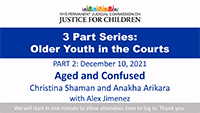
Youth in Court
At its inception, the Commission predominantly concentrated its efforts on the youngest children before the courts - securing early intervention, establishing a statewide system of Children’s Centers in the Courts, improving court proceedings, promoting the healthy development of children in foster care and focusing on the needs of infants involved in child welfare proceedings.
Over the years, the Commission expanded its focus to include older youth involved with the courts, focusing particularly on encouraging child and youth participation in their court proceedings and examining juvenile justice issues, including juvenile probation and issues affecting dually adjudicated youth.
As a means to promote the safety, permanency and well-being for all children involved with New York State courts, the Commission works to increase the participation of children in their court proceedings, deliver information and education to stakeholders around the particular needs of this population, and support compliance with recent federal and New York State laws relating to Family Court. This will ultimately lead to better decisions and better outcomes for children and their families.
Changing the Narrative to Be Trauma-Responsive
Juvenile justice staff are well positioned to challenge and guard against biases within the youth justice system, as well as narratives and buzz words often used to describe and/or explain youth behaviors without a factual basis. Each session in this series will build upon the others to provide juvenile justice staff with the language and resources to best support the youth they encounter to promote positive outcomes and overall well-being. Specifically, this series will provide information about
- the systemic disparities that exist at each system point for youth of color in the youth justice system (data from OCFS and DCJS);
- how biases in the larger society and within the system disadvantage certain youth populations, particularly youth of color at each system point (media narratives, systemic biases, and implicit biases);
- how such biases, as well as a lack of understanding of trauma and its impact on youth and their behavior often lead to deeper penetration of youth into the youth justice system (bias info and trauma training);
- practice considerations to defend against such biases and lack of trauma-responsive approach (bias info and trauma training); and
- how to advocate for, access and engage youth in community-based services, supports and opportunities to meet their needs while promoting public safety (roadmap/questions to ask at the local level to access such interventions).
This Juvenile Justice Online Training Series was developed by the New York State Partnership for Youth Justice (PYJ), which is an interbranch collaborative focused on improving outcomes for youth in the justice system. The PYJ promotes continuous quality improvement and supports policy and practice changes that further the work of youth justice reform efforts in New York State.
Disparities and Bias in the Youth Justice System
Session 1: October 3, 2023
Presenters
Rebecca Dimond, MS, MA - NYS Division of Criminal Justice Services, Office of Justice Research and Performance
Brian Rainey, MA - Office of Children and Family Services, Bureau of Research Evaluation and Performance Analytics
Ashley Hodge, MSW, Ph.D. - Office of Children and Family Services, Bureau of Research Evaluation and Performance Analytics
Hon. Alison Hamanjian - Supervising Judge, Richmond County Family Court
Dawne Mitchell, Esq. - Chief Attorney, Juvenile Rights Practice, The Legal Aid Society
Rashida D. Cartwright-Thigpen, Esq. - Senior Assistant County Attorney, Westchester County Department of Law
Moderated by Kristen Conklin, Esq. - NYS Unified Court System, Permanent Judicial Commission on Justice for Children
CLE credits are no longer available to viewers. This program is implemented in partnership with the NYS Unified Court System Office for Justice Initiatives, the NYS Permanent Judicial Commission on Justice for Children, and the NYS Partnership for Youth Justice.
 Disparities and Bias in the Youth Justice System (Video)
Disparities and Bias in the Youth Justice System (Video)
For closed captioning, click the CC button at the bottom right of the video player.
Accessing and Engaging Youth in Community-Based Services, Supports and Opportunities
Session 3: October 31, 2023
Presenters
Stephen R. Weisbeck, Esq. - Legal Aid Society of Rochester
Jessica Stanis, MPA, MSW - NYS Office of Mental Health
James Schuler - Youth Advocate Program of Wayne County
Jason Williams - New York State Juvenile Justice Advisory Group
Moderated by Kristen Conklin, Esq. - NYS Unified Court System, Permanent Judicial Commission on Justice for Children
CLE credits are no longer available to viewers. This program is implemented in partnership with the NYS Unified Court System Office for Justice Initiatives, the NYS Permanent Judicial Commission on Justice for Children, and the NYS Partnership for Youth Justice.
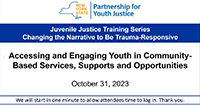 Accessing and Engaging Youth in Community-Based Services, Supports and Opportunities (Video)
Accessing and Engaging Youth in Community-Based Services, Supports and Opportunities (Video)
For closed captioning, click the CC button at the bottom right of the video player
Older youth who are no longer children but not quite adults have unique needs and require a unique and tailored response from the justice system. The New York State Permanent Judicial Commission on Justice for Children explored those dynamics through a series that drilled into issues of foster care emergence, race and trauma as it pertains to this particularly vulnerable population.
Transition-Aged Youth in Foster Care: Every Youth Needs Someone
Sharrica Miller, PhD, RN (Biography)
Youth in foster care experience a tremendous amount of instability as they are shuffled from home to home. They have a constant fear and anxiety of the unknown, and a remarkable loss of security due to others making decisions about their life. Child welfare professionals and foster families often act with the best interest of the child in mind, but may be unaware of the emotional strain that foster care elicits.
There is strong evidence to suggest that foster youth who have at least one loving, stable adult in their lives experience better life outcomes in comparison to youth who do not. Thus, the overall goal of this presentation is highlight best practices for ensuring that youth are able to meet this goal as early in their foster care journey as possible. Part informative, part inspirational, this presentation highlights Dr. Miller’s 12-year journey through foster care and provide a concrete example of the importance that child welfare professionals and others that work in this arena can have on the lives of foster youth.
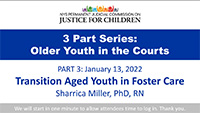 Transition-Aged Youth in Foster Care (Video)
Transition-Aged Youth in Foster Care (Video)
For closed captioning, click the CC button at the bottom right of the video player.
To contact Dr. Miller for information, future speaking engagements or to facilitate a Diversity, Equity and Inclusion (DEI) workshop, please email Sharrica.Miller@ucla.edu. Her dissertation, Transition Readiness, Perceived Health, and Health Services Utilization in Transitional Age Foster Youth Compared to Controls, can be viewed at: https://escholarship.org/uc/item/6jk4p6qd. Thank you to our co-sponsor, the Redlich Horwitz Foundation for its generous support of our programming.
Aged and Confused: Documentary screening and discussion
Christina Shaman and Anakha Arikara, with Alex Jimenez
On December 10, 2021, the PJCJC held a screening event and facilitated panel discussion with the star and the creators of the film Aged and Confused. Aged and Confused is a 35-minute short documentary about one young man's journey aging out of foster care in New York City. Directed by Christina Shaman and Anakha Arikara, the film was recently selected to be presented at the National Association of Counsel for Children (NACC) Child Welfare Law Conference and the International Society of Family Law 17th World Conference.
Although the full documentary is not available, you can view the trailer here: https://vimeo.com/user105891722, and enjoy the discussion by clicking below.
For more information about the film, visit the Aged and Confused website or email agedandconfusedfilm@gmail.com. Thank you to our co-sponsor, the Redlich Horwitz Foundation for its generous support of our programming.
For closed captioning, click the CC button at the bottom right of the video player.
Fetal Alcohol Spectrum Disorders and the Courts
The Third Judicial District Gender Fairness Committee, in conjunction with the NYS Permanent Judicial Commission on Justice for Children, Justice For Orphans and the Redlich Horwitz Foundation (https://www.rhfdn.org/) sponsored a program to address an often undetected issue within the courts and the legal system: Fetal Alcohol Spectrum Disorder (FASD). The virtual program covers the medical, psychological and legal aspects of FASD, and concludes with a panel discussion that includes parents of children diagnosed with prenatal alcohol-induced brain damage, a family court judge, advocates, and a nurse/ attorney who has seen this problem from both a clinical and legal perspective.
The original airing of this program was October 26, 2021. CLE credits are no longer available to viewers. Thank you to our co-sponsors: Albany Law School, Capital District Women's Bar Association, Center for Women in Government & Civil Society, National Organization on Fetal Alcohol Syndrome, and the New York Women's Bar Association.
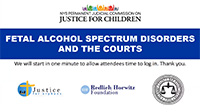 Fetal Alchohol Spectrum Disorders & the Courts (Video)
Fetal Alchohol Spectrum Disorders & the Courts (Video)
For closed captioning, click the CC button at the bottom right of the video player.
Materials:
Implications for Attorneys and Courts
FAS and FASD, New York Law Journal
Advocacy, Representation, and Hearings in Virtual Family Court
Due to the Coronavirus pandemic, in-person court appearances are currently limited and certain cases are proceeding with virtual court appearances. This requires people, including judges, attorneys and litigants, to utilize technology platforms that may be unfamiliar to them.
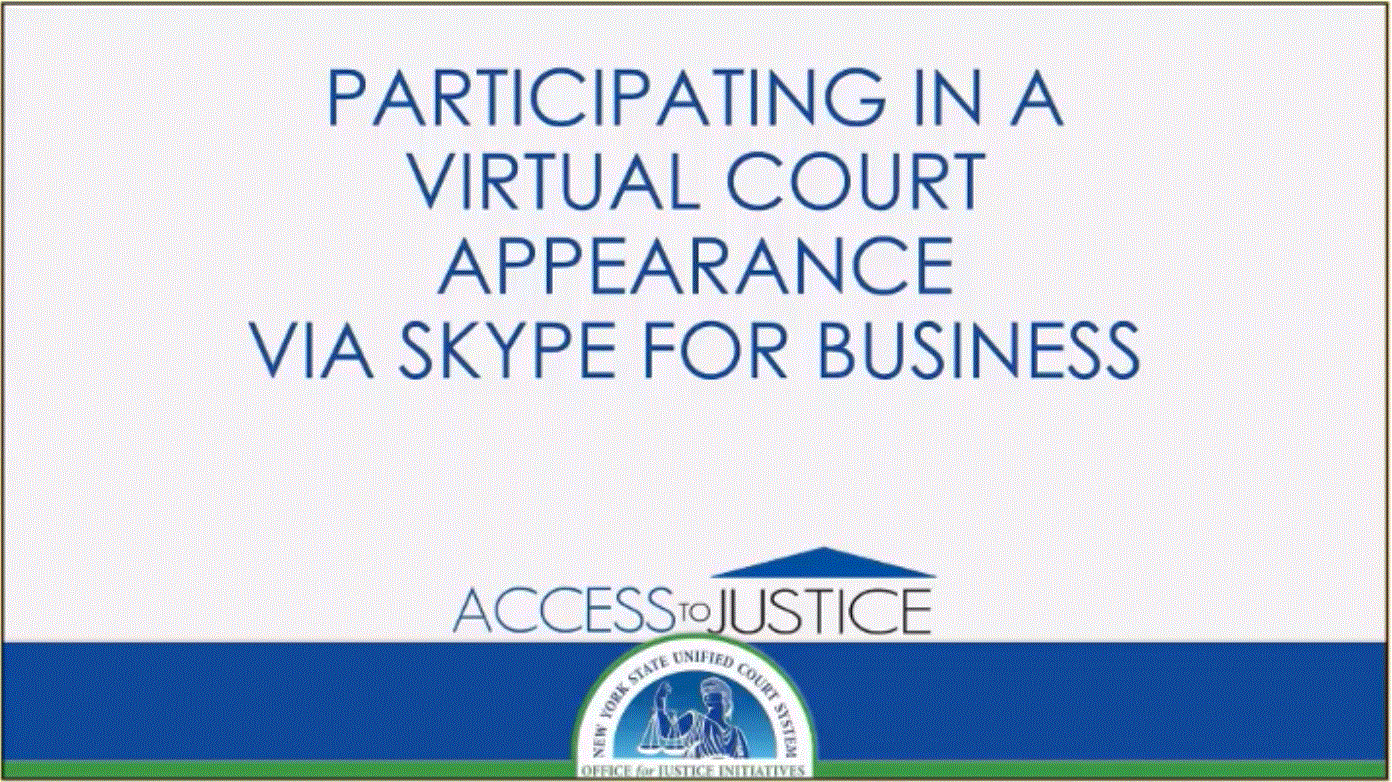 Participating in a Virtual Court Appearance via Skype for Business (Video)
Participating in a Virtual Court Appearance via Skype for Business (Video)
As the first in a series of programs created by the NYS Unified Court System addressing topics particular to the virtual Family Court setting, this presentation is intended for attorneys, parents, youth, and child welfare agencies/organizations. “Participating in a Virtual Court Appearance Via Skype for Business” answers basic questions about taking part in a court proceeding using Skype such as:
- How do I know if I need to appear remotely?
- What do I need to appear remotely?
- What will I see when I join?
- How should I present myself?
- How do I connect when it’s time?
Subsequent programs will dive deeper into the technical details, legal ramifications and practical considerations. This series is being produced because of the generous support of the Redlich Horwitz Foundation.
 Family Court Representation in the Virtual Age (Video)
Family Court Representation in the Virtual Age (Video)
The second program in the series is “Family Court Representation in the Virtual Age”. The COVID-19 pandemic has greatly impacted the way in which judges, advocates and litigants address the nuanced issues that arise daily in a Family Court setting. In this program, Albany County Family Court Judge Richard Rivera and Jaya L Connors, the Assistant Professor of Law and Director of Family Violence Litigation Clinic at the Justice Center at Albany Law School, discuss the dynamics, pitfalls and future of virtual representation in the Family Court.
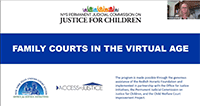 Family Court in the Virtual Age (Video)
Family Court in the Virtual Age (Video)
The third program in the series is “Family Court in the Virtual Age”. The vital work of New York’s Family Courts has continued throughout the COVID-19 pandemic, albeit in a different format. The recording of a live virtual roundtable discussion addresses the Family Court’s reaction to the pandemic and analyze the implications, both now and in the future, for virtual representation. It features:
* Hon. Edwina Mendelson, Deputy Chief Administrative Judge, Office for Justice Initiatives
* Hon. Craig J. Doran, Administrative Judge, Seventh Judicial District
* Hon. Jeanette Ruiz, Administrative Judge, New York City Family Court
* Henry M. Greenberg, chairman of the Chief Judge’s Commission to Reimagine the Future of the New York Courts.
The program is made possible through the generous assistance of the Redlich Horwitz Foundation (https://www.rhfdn.org/), and implemented in partnership with the Office of Justice Initiatives, the Permanent Judicial Commission on Justice for Children, and the Child Welfare Court Improvement Project.
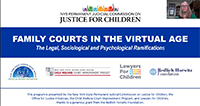 Family Courts in the Virtual Age: The Legal, Sociological and Psychological Ramifications (Video)
Family Courts in the Virtual Age: The Legal, Sociological and Psychological Ramifications (Video)
The fourth program in the series is “Family Courts in the Virtual Age: The Legal, Sociological and Psychological Ramifications”. The program examines the ramifications of conducting Family Court matters remotely – what the small body of case law is telling us so far, where the potential appellate issues lie as well as the psychological/ sociological and ultimately legal implications for children and families.
The panelists are:
* Hon. Richard A. Dollinger, Acting Justice, Supreme Court, Seventh Judicial District
* Timothy M. Tippins, Esq., an attorney who has engaged in family law practice since 1975
* Dr. Jeffrey Wittmann, a psychologist who specializes in custody cases
Please note that the CLE credit is not offered for viewing the recorded version of the program. The series is made possible through a generous grant from the Redlich Horwitz Foundation, and implemented in partnership with the Office of Justice Initiatives, the Permanent Judicial Commission on Justice for Children, and the Child Welfare Court Improvement Project.
Tips & Tools for Attending Your Permanency Hearing
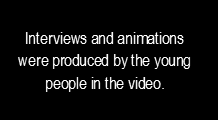
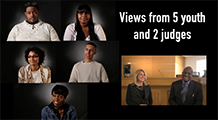 Your Permanency Hearing and You (Video)
Your Permanency Hearing and You (Video)
Transcript
Starring youth who have been in foster care and family court judges,
the video describes the permanency hearing court process
and gives some tips for youth thinking about attending their permanency hearing.
 To ensure the youth voice – the youth perspective – is heard and included in
discussions on engaging children and youth in their court proceedings, the
Commission working the New York State Office of Children and Family
Services, the New York State Court Improvement Project and Youth in
Progress, developed digital stories in web-based and DVD formats.
To ensure the youth voice – the youth perspective – is heard and included in
discussions on engaging children and youth in their court proceedings, the
Commission working the New York State Office of Children and Family
Services, the New York State Court Improvement Project and Youth in
Progress, developed digital stories in web-based and DVD formats.
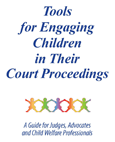 The Tools for Engaging Children in Their Court Proceedings handbook
highlights the developmental stages of school-age children (ages 5 to 20
years), provides a series of age-appropriate questions and tips on how to
engage children in their court proceedings.
The Tools for Engaging Children in Their Court Proceedings handbook
highlights the developmental stages of school-age children (ages 5 to 20
years), provides a series of age-appropriate questions and tips on how to
engage children in their court proceedings.






